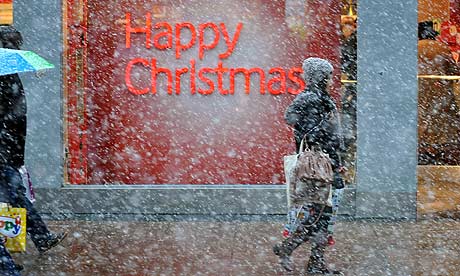All Information For You
 December’s wintry weather was blamed for the shock fall in GDP. Photograph: Ian Nicholson/PA
December’s wintry weather was blamed for the shock fall in GDP. Photograph: Ian Nicholson/PAThe UK economy shrank by a shock 0.5% in the last quarter of 2010 as Britain’s recovery from recession faltered.
Most of the unexpected contraction was caused by the wintry weather that gripped Britain last month, the Office for National Statistics said. Without it, GDP would probably have been flat – suggesting that the UK economy had already run out of steam before the snow hit.
Economists said the first estimate of GDP for the last quarter was much worse than expected, and meant that Britain could now suffer a double-dip recession. With inflation hitting 3.7% last month, there are also growing fears the UK is heading for an unpleasant dose of “stagflation”.
The eagerly awaited GDP figures put the government’s austerity programme under fresh scrutiny, with Labour again arguing that cuts are being made too deeply, and too rapidly.
“With families and businesses already facing both rising unemployment and rising inflation, the fact that the economy is now shrinking means the Conservative-led government’s claims to have saved the economy and secured the recovery will ring very hollow indeed,” said shadow chancellor Ed Balls.
“It is now becoming even clearer that when David Cameron and George Osborne complacently congratulated themselves in the autumn for securing economic recovery, this was in fact the result of decisions taken by the Labour government to get the economy moving again,” Balls added.
Osborne, though, refused to change tack despite the evidence that Britain’s economy shrank last quarter.
“There is no question of changing a fiscal plan that has established international credibility on the back of one very cold month,” he said.
“That would plunge Britain into a financial crisis. We will not be blown off course by bad weather,” Osborne added.
The data sent the pound falling by nearly one and a half cents against the dollar to $ 1.575, and pushed the FTSE 100 index down by 36 points.
Deputy prime minister Nick Clegg said Britain’s economic recovery was still in its “early days”.
He said: “The government has been doing the difficult work of putting the building blocks in place.”
Yesterday, though, the outgoing head of the CBI claimed that the government had failed to create a credible growth strategy.
Labour MP Chuka Umunna claimed Cameron’s administration was “a government of bystanders”.
He said: “Even accounting for the snow, today’s ONS figures show the Conservative-led government has no policies for growth.”
The ONS reported that the services sector – the dominant part of the UK economy – shrank by 0.5% in the last quarter. Construction suffered a 3.3% decline, but industry grew by 0.9%.
Data released earlier this month had shown that services suffered a sharp drop in activity in December, when snow and ice prevented many people from reaching their offices or the high street. Output in the construction industry also slowed last month, which analysts blamed on public sector cutbacks and the weather.
Alasdair Reisner, of the Civil Engineering Contractors Association, urged the government to do more to support the construction industry, or risk a further contraction in the economy.
“It is clear that a downturn in activity in the industry has an impact that is felt far beyond the site fence, acting as a brake on the country’s ambitions to return to growth,” said Reisner.
High street firms also suffered from the snow, with the retail sector suffering its worst December in 12 years.
City experts had expected GDP to grow by anything from 0.1% and 0.7% – with last month’s weather making predictions harder.
George Buckley of Deutsche Bank said today’s 0.5% decline was “quite shocking”, and questioned whether the snow could really be blamed for the drop in economic activity.
Hetal Mehta at Daiwa Capital Markets said it was “an absolute disaster for the economy”.
“It seems that the economy is incredibly vulnerable, and with the fiscal tightening yet to fully bite, we will have to brace ourselves for a bumpy ride,” Mehta said.
Charles Davis, managing economist at CEBR, was concerned that the UK economy experienced a “complete loss of momentum” at the end of last year.
“Few of us could have expected such a sharp contraction in output and the United Kingdom economy now faces the prospect of returning to recession,” Davis warned.
On a year-on-year basis, GDP during the quarter was 1.7% higher than in the last three months of 2009 – sharply slower than the 2.6% growth expected in the City.
Some economists predicted that the data could well be revised upwards in the coming weeks. Usually the ONS has little data from the final month of any quarter when it publishes its first estimate of GDP. This time, though, it put extra effort into trying to quantify the impact of the snow in December.
Andrew Goodwin, senior economic adviser to the Ernst & Young ITEM Club, said he was sceptical that the economy had shrunk as much as the ONS reported.
“These figures are quite staggering and scarcely believable. No doubt this will mostly be attributed to the snow, and that undoubtedly would have had a significant effect. However, the ONS have also said that GDP would have been flat had we not had that disruption and quite simply that does not square with what any of the survey indicators are telling us,” Goodwin said.
An early interest rise also looks less likely, according to Howard Archer of IHS Global Insight.
“Given that the contraction in GDP in the fourth quarter occurred even before the fiscal tightening had really kicked in, it reinforces already serious concern over the economy’s ability to grow significantly in the face of the spending cuts and tax hikes that will increasingly bite as 2011 progresses,” he said.
The Guardian World News
No comments:
Post a Comment